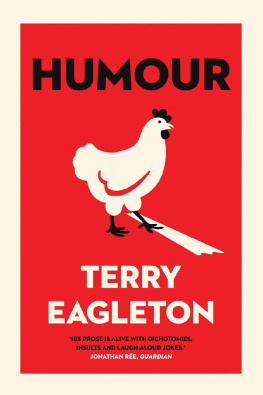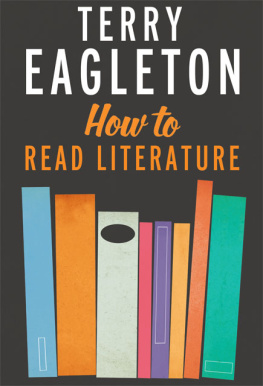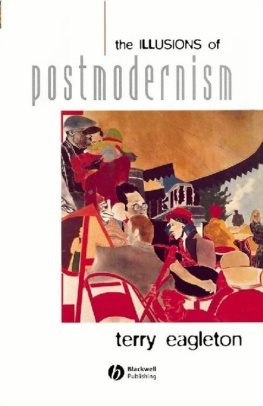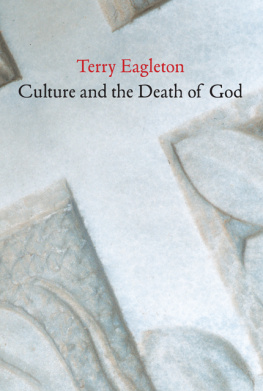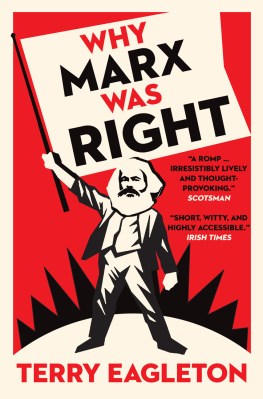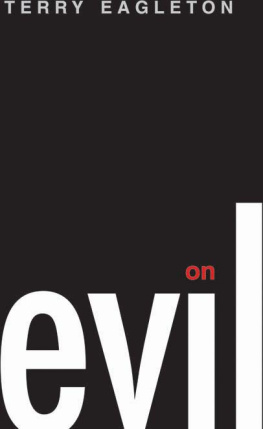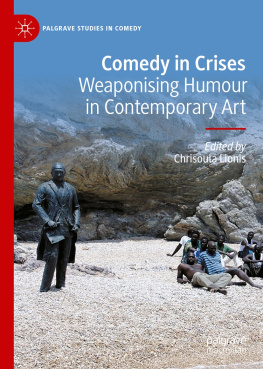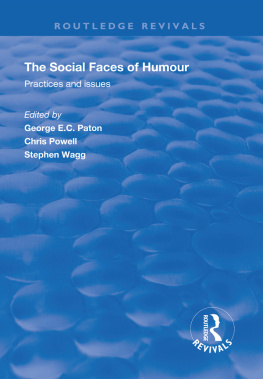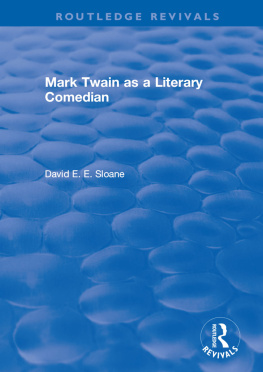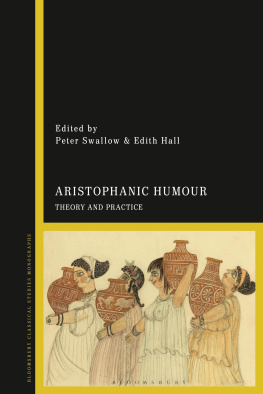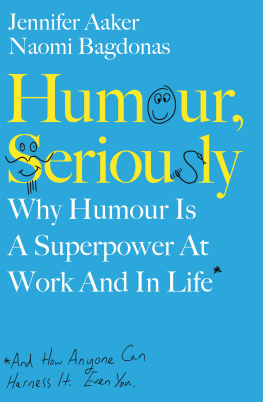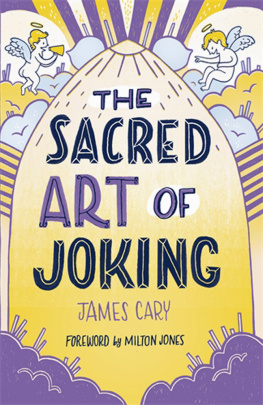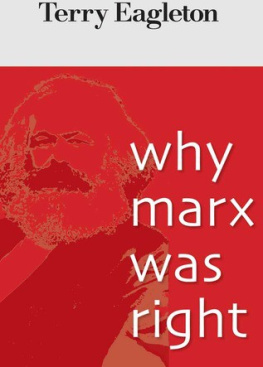HUMOUR
To Those Born After, originally published in German in 1939 as An Die Nachgeborenen, translated by Tom Kuhn. Copyright 1939, 1961 by Bertolt-Brecht-Erben / Suhrkamp Verlag. Translation copyright 2019, 2015 by Tom Kuhn and David Constantine, from COLLECTED POEMS OF BERTOLT BRECHT by Bertolt Brecht, translated by Tom Kuhn and David Constantine. Used by permission of Liveright Publishing Corporation.
Copyright 2019 Terry Eagleton
All rights reserved. This book may not be reproduced in whole or in part, in any form (beyond that copying permitted by Sections 107 and 108 of the U.S. Copyright Law and except by reviewers for the public press) without written permission from the publishers.
For information about this and other Yale University Press publications, please contact:
U.S. Office:
Europe Office:
Set in Adobe Garamond Regular by IDSUK (DataConnection) Ltd
Printed in Great Britain by TJ International Ltd, Padstow, Cornwall
Library of Congress Control Number: 2019931197
ISBN 978-0-300-24314-7
A catalogue record for this book is available from the British Library.
10 9 8 7 6 5 4 3 2 1
For Trevor Griffiths
CONTENTS
PREFACE
A good many studies of humour begin with the shamefaced acknowledgement that to analyse a joke is to kill it dead. This is not in fact true. It is true that if you want to raise a laugh it is unwise to joke and dissect your joke at the same time, rather as some US presidents are said to have been unable to walk and chew gum simultaneously; but there are not many comedians who come up with a theoretical inquiry into their wisecracks at the very moment they are delivering them. Those who do so are generally to be found in job centres, not in clubs and theatres. (There are, to be sure, exceptions, such as the brilliantly original comedian Stewart Lee, who deconstructs his own comedy as he goes along and analyses the audiences response to it.) Otherwise, humour and the analysis of humour are perfectly capable of coexisting. Knowing how a joke works does not necessarily sabotage it, any more than knowing how a poem works ruins it. In this as in other matters, theory and practice occupy different spheres. An anatomical acquaintance with the large intestine is no obstacle to enjoying a meal. Gynaecologists can lead fulfilling sex lives, while obstetricians can coo over babies. Astronomers confronted every day with the utterly insignificant status of the Earth within the universe do not hit the bottle or leap off a cliff, or at least not for that reason.
There are, to be sure, a number of remarkably humourless accounts of humour on the library shelves. Some such studies come thickly furnished with graphs, charts, diagrams, statistics and reports of laboratory experiments. One glum trio of scientific researchers even appear to cast doubt on whether jokes actually exist. There are, however, some illuminating commentaries as well, a range of which I have drawn upon in this book. Theories of humour can be as useful as theories of polygamy or paranoia as long as they are marked by a certain intellectual modesty. Like any fruitful hypothesis, they need to acknowledge their own limits. There will always be anomalous cases, unresolved puzzles, awkward consequences, inconvenient implications and the like. Theories can be riddled with discrepancies and still perform some productive work, rather as a fuzzy photograph of someone can be better than no photograph at all, and a job worth doing is usually worth doing badly. The incomparable William Hazlitt quotes a fellow author, Isaac Barrow, as observing that humour is so versatile and multiform, a phenomenon of which any exhaustive definition is impossible to come by:
Sometimes it is lodged in a sly question, in a smart answer, in a quirkish reason, in a shrewd intimation, in cunningly diverting or cleverly restoring an objection; sometimes it is couched in a bold scheme of speech, in a tart irony, in a lusty hyperbole, in a startling metaphor, in a plausible reconciliation of contradictions, or in acute nonsense... a mimical look or gesture passeth for it; sometimes an affected simplicity, sometimes a presumptuous bluntness giveth it being; sometimes it riseth only from a lucky hitting upon what is strange: sometimes from a crafty wresting obvious matter to the purpose; often it consisteth in one knows not what, and springeth up one can hardly tell how... It is, in short, a manner of speaking out of the simple and plain way... which by a pretty surprising uncouthness in conceit or expression doth affect and amuse the fancy, shewing in it some wonder and breathing some delight thereto.
It would be a foolhardy theorist who would seek to cram all that into a single formula. Even so, humour is not simply an enigma, any more than poetry is. It is possible to say something relatively cogent and coherent about why we laugh, though whether I have done so in these pages is up to the reader to judge.
T.E.
2017
ON LAUGHTER
They laughed when I told them I wanted to be a comedian. Well theyre not laughing now.
Bob Monkhouse
Laughter is a universal phenomenon, which is not to say a uniform one. In an essay entitled The Difficulty of Defining Comedy, Samuel Johnson remarks that though human beings have been wise in many different ways, they have always laughed in the same way, but this is surely doubtful. Laughter is a language with a host of different idioms: cackling, chortling, grunting, chuckling, shrieking, bellowing, screaming, sniggering, gasping, shouting, braying, yelping, snickering, roaring, tittering, hooting, guffawing, snorting, giggling, howling, screeching and so on. It can come in blasts, peals, gales, gusts, ripples or torrents, blaring, trumpeting, trickling, swirling or piercing. There are also different ways of smiling, from beaming, smirking and sneering to grinning, leering and simpering. Smiling is visual and laughter primarily aural, but when T. S. Eliot writes in The Waste Land of a chuckle spread from ear to ear he fuses the two phenomena.
Chortling, sniggering and so on denote different physical modes of laughter, involving as they do such matters as volume, tone, pitch, pace, force, rhythm, timbre and duration. But laughter can also convey a range of emotional attitudes: joyous, sarcastic, sly, raucous, genial, wicked, derisive, dismissive, nervous, relieved, cynical, knowing, smug, lascivious, incredulous, embarrassed, hysterical, sympathetic, skittish, shocked, aggressive or sardonic, not to speak of purely social laughter, which need not express the least amusement. In fact, most of the forms of laughter I have just listed have little or nothing to do with humour. Laughter may be a sign of high spirits rather than amusement, though you are more likely to think things funny if you are feeling euphoric in the first place. Physical modes and emotional attitudes can be combined in a variety of ways, so that you can titter nervously or derisively, bray genially or aggressively, giggle with surprise or delight, cackle appreciatively or sardonically and so on.
The paradox, then, is that though laughter itself is purely a question of the signifier mere sound without sense it is socially coded through and through. It is a spontaneous physical occurrence (most of the time, anyway), but one which is socially specific, and as such cusped between nature and culture. Like dance, laughter is a language of the body (Descartes called it an inarticulate and explosive cry), though the body is also enmeshed in meaning of a more conceptual kind. Even so, it will never be entirely at home in that more rarefied sphere. There is always a surplus of brute materiality over sense, and it is this that a lot of humour allows us to savour. It also encourages us to accept this incongruity as natural. Farce in particular tends to dramatise this fateful collision between body and mind.

